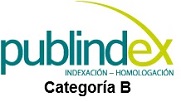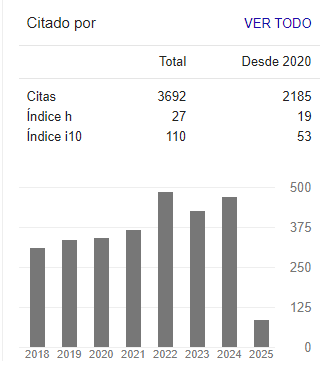Code of Ethics and Good Conduct
Code of good conduct in scientific publishing
The Ingeniería journal promotes and defends the universal principles of good practices in scientific publication, particularly those that refer respecting the community, the selfless and voluntary work of peer reviewers and editors, and intellectual property. Ingeniería is therefore committed to high quality standards and considers any form of plagiarism unacceptable, so as to respect copyrights, patent rights, disclosure rights, and the moral rights of third parties. Ingeniería will undertake the processes necessary to avoid and resolve possible conflicts of interest with regard to its publications. The following link (https://publicationethics.org/resources/guidelines-new/principles-transparency-and-best-practice-scholarly-publishing) contains the practices deemed inappropriate and intolerable by the journal’s Editorial Committee.
Authors wishing to submit articles shall adhere to Ingeniería’s Publication standards and Code of good publication practices.
It is important to add that all manuscripts are checked using Turnitin, a plagiarism detection tool.
Ingeniería follows the guidelines established by the Committee on Publication Ethics (COPE) regarding issues and misconduct.
Ingeniería journal's Code of good publication practices
General obligations and responsibilities of the editorial team:
- Satisfying the needs of the readers and authors.
- Continuously improving the journal.
- Implementing processes that ensure the quality of the material accepted for publication.
- Defending freedom of speech
- Preventing commercial interests to compromise the appropriateness of the results.
- Being always willing to publish errata, clarifications, retractions, or apologies, as appropriate.
Regarding the relationship with the readers:
Readers must be informed about who has funded a research and their role in the contents of the publication.
Regarding the relationship with the authors:
- The Editor's decisions to accept or reject an article for publication should be based on the article's significance, originality, and clarity, as well as the validity of the study and its relevance to the journal's objectives.
- The Ingeniería journal ensures the publication of peer review processes and evaluations, as well as the procedures and requirements for submission.
- The editors will publish guidelines for the authors regarding all that is expected of them.
- The submission procedures and requirements will be regularly updated and reviewed, and authors will be informed of any changes.
- Finally, the Ingeniería journal commits to addressing any complaints and requirements made by the authors.
Complaints:
The Ingeniería journal shall promptly respond to any complaints and will make sure that there is a channel for dissatisfied claimants to escalate their grievances to higher instances if necessary.
Regarding the relationship with reviewers:
Reviewers will be informed of all procedures and guidelines related to the review process. A double-blind review process ensures the anonymity of the reviewers, keeping their identity protected at all times.
Considerations concerning submitted articles
Upon article submission, the authors must declare that their work has not been previously published, except for abstracts presented at scientific events, that it is not under consideration for publication elsewhere, and that it has received the final approval of all co-authors. To ensure the originality of the submissions, anti-plagiarism software will be used.
Determining authorship
Prior to submitting an article, Ingeniería emphasizes the need for a clear and comprehensive evaluation of authorship attribution. This entails a precise description of each author's individual contributions to the work. The journal recommends adhering to the authorship criteria defined by the CRediT taxonomy (Contributor Roles Taxonomy). Furthermore, authors are kindly requested to include an Author contributions section at the end of the article, where each of their specific contributions should be explicitly outlined.
It is essential to clarify that the journal acknowledges the authorship of those who are responsible for:
- Substantial contributions to the formulation, justification, or design of the work
- The acquisition, analysis, or interpretation of the work's data
- The drafting or critical review of the manuscript, providing significant scientific insights that contribute to the work.
Moreover, any individual identified as an author must be prepared to assume responsibility for all aspects discussed in the work and be readily available to address inquiries concerning the accuracy and integrity of any part of the research. Contributors who do not meet these conditions should not be listed as authors but may be acknowledged in the work's Acknowledgments section.
Additionally, it is imperative that authors carefully review the order in which they are presented in the article before submission. Any proposed additions, removals, or changes in the author order must be formally requested through a document signed by all authors. This document should be submitted via email to the Editorial Committee, reasonably justifying the requested change. The Editorial Committee will assess each case and make a decision based on its appropriateness.
Publication of errata and retractions
If necessary, the journal will release errata and retractions for its previously published works. The first scenario, errata, involves the publication of a document appended to the original work, which acknowledges any errors made and provides their corresponding corrections. In the second scenario, a document is published to acknowledge unintentional or deliberate inaccuracies within the original work. These inaccuracies may include, but are not limited to, plagiarism or the presentation of manipulated data or images that compromise the validity of the obtained results.
Conflicts of interest
Ingeniería will deploy the necessary mechanisms to avoid or resolve any possible conflicts of interest associated with the authors, evaluators, and/or the editorial team. For example, during the evaluation process, the journal screens the evaluators for any conflicts of interest.
Informed consent
The Ingeniería journal considers an informed consent policy to be crucial for ensuring the protection of participants and the ethical integrity of research. In this regard, Ingeniería establishes the following policies:
- Informed consent is mandatory for all research participants, including human and animal subjects.
- Researchers must obtain informed consent voluntarily and free from any pressure or coercion. Informed consent must be obtained in writing and signed by the participant or their legal representative before participating in research.
- The content of the informed consent should be clear and understandable, and it should include information about the purpose of the research, the procedures the participant will undergo, potential risks and benefits, and the option to withdraw participation at any time.
- Participants should be informed of the possibility that the results of the research may be published, and their specific consent should be obtained for publishing any information that identifies them.
- The lead researcher is responsible for ensuring that informed consent is appropriately obtained and for maintaining proper records.
- In the case of research involving vulnerable participants, such as minors, persons with disabilities, or dependent individuals, special procedures must be followed to ensure their protection and informed consent.
These policies align with the ethical and legal standards established in the field of science. Additionally, Ingeniería may require authors to provide evidence that informed consent has been obtained before the publication of an article that includes research data involving human or animal participants.
Statement on artificial intelligence
Artificial intelligence (AI) and AI-assisted technologies should not be designated as authors or co-authors, nor should they be cited as such. Authorship carries responsibilities and tasks that are inherently human and cannot be ascribed to or executed by AI systems.
Authors are required to disclose the utilization of generative AI and AI-assisted technologies by incorporating a statement at the end of their manuscript, before the References section.
Inappropriate Behavior Not Tolerated By Journal
1. Wrongly addressed submission intended to other journal different to INGENIERIA Journal.
2. Plagiarism or self-plagiarism.
3. Simultaneous submission of a manuscript to several journals.
4. Unjustified withdraw of a submitted manuscript due to unfavourable reviews.
5. Unjustified abandonment of submission at any stage of the process: verification of submission conditions, peer-review process or layout and final proof adjustments.
6. Excessive use of self-citation, both from own publications and from previous publications of INGENIERÍA Journal.
Penalties For Inappropriate Behaviour
1. Official communication sent to the authors indicating the misconduct, requesting a letter of apology addressed to the Editorial Committee, Scientific and/or peer reviewers.
2. Notification sent to the Colombian Network of Engineering Journals (Red Colombiana de Revistas de Ingeniería) reporting the case of misconduct with evidences.
3. Official communication sent to author’s affiliated or financing institutions informing about the misconduct.
4. Retraction of the paper in case it has been published, notifying this decision publicly in the editorial pages of the Journal and in an official letter addressed to the entities of institutional affiliation of the authors.
5. Application of a publication veto to the authors in the Journal during a period determined by the Editorial Board according to the seriousness of the misconduct.
6. Notification of the case and the result of the investigation to the competent authorities, in case the good will of the Universidad Distrital FJC or the INGENIERIA Journal is compromised.
Procedure in Case of Suspicion of Plagiarism and Duplicate Publication
INGENIERIA Journal will follow the guidelines established by the Publications Ethics Committee (COPE) to handle unethical issues or behaviours:
- Suspicion of plagiarism in a submitted manuscript
- Suspicion of plagiarism in a published paper
- Suspicion of duplicate publication in a submitted manuscript
- Suspicion of a duplicate publication in a published paper
*It is possible to view the document in: Code of Good Conduct


2.jpg)










